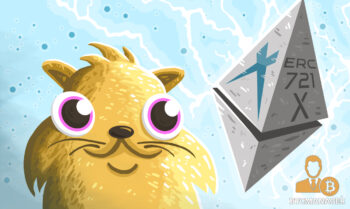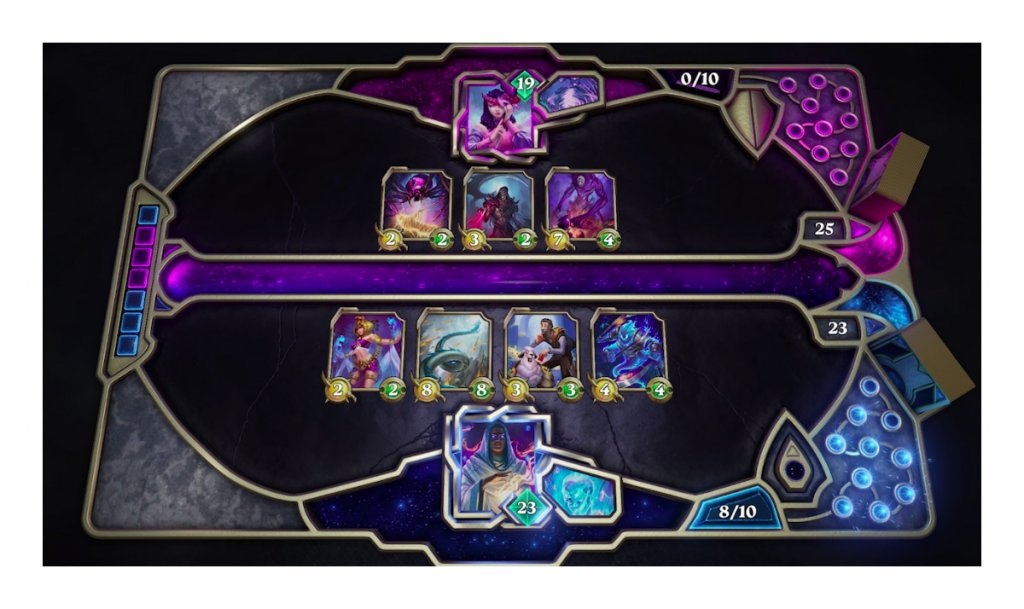![Blockchain May Change How Real-World Tabletop Card Games are Played [Interview]](http://cryptoslate.com/wp-content/uploads/2018/12/blockchain-gambling-social-300x158.jpg)
2019-1-11 04:01 |
As blockchain technology hits the gaming industry, most game developers are only exploring subtle integrations. Meanwhile, a Seattle startup is making extensive use of the technology to completely reinvent how tabletop card games are played and distributed.
New Gaming ParadigmCryptoSlate recently spoke with Seattle studio Cryptogogue about their unique crypto-backed trading card game and radical plan for distributing it. Having noticed that many companies are “trying to map existing paradigms to the blockchain”, Cryptogogue set out to take this concept to the next level and “gamify the blockchain” itself.
The result is Volition, a hybrid concept that combines a traditional printed trading card game with all of the features of crypto-collectibles. The game’s name, Volition, means “an act of making a choice or decision; the power of choosing or determining.”
“There are so many crypto projects out there that help facilitate a better physical to digital transformation,” says Ken Pilcher, “but not many that help bring it full circle and back to something tangible.”
The game is built on top of a new digital-to-physical distribution platform where the game’s content is published and sold to the community of miners running the network. Meanwhile, the game is actually played on a physical tabletop with real-world friends.
When it comes time to play, anyone who owns a card can print it out and use it in a game.
Changing Play and TradeThanks to blockchain technology, proof of ownership and authenticity can easily be verified by scanning a code on the card and checking it against the network. Cards may be checked casually by scanning them with an app on your phone, or systematically by judges and organizers during tournaments.
Because a blockchain is the distribution platform, it will be the community of users that keep the game going. Volition will run on an entirely custom blockchain platform with specialized mining nodes and wallets.
Related: How EOS, TRON and Ethereum Have Impacted the Gambling IndustryNew game assets are distributed algorithmically through mining packs. Cards are released as virtual booster packs that need to be opened just like real packs. Miners can even configure their systems to mine for specific sets.
Then, these assets can be traded across built-in marketplace nodes. Users can create their own stores on the network to trade and sell cards with no fees using the currency built directly into the platform. Alternatively, cards can still be traded online or even in person, changing the dynamic of digital ownership.
Since game assets are stored digitally, Volition allows for the evolution of player cards; cards can level up, get combined, and unlock powers over time.
Since these assets are tracked on a blockchain, gamers can also see a card’s entire immutable history, including previous ownership. If a card was used by someone famous to win a tournament, then the next owner will have a record without a pen ever touching the card.
Tenacious Games and The SpoilsTo understand how the team got to where they are today, we have to look more than a decade into the past.
In 2006, freshly minted gaming startup Tenacious Games released a clever trading card game called The Spoils. The Spoils was well received and quickly developed a dedicated cult following. The game offered a variety of innovations and was known for being the first trading card game to offer a free and open beta.
Victims of bad timing, Tenacious Games entered their series A financing just as the financial crash hit in early 2007. By 2009, struggling from undercapitalization, Tenacious Games sold the rights for The Spoils to Arcane Tinmen—who continued to support the game until it was finally shelved in December of 2016.
The Path to VolitionIt was The Spoils that originally brought Cryptogogue’s two key founders together: technologist Patrick Meehan and game designer Ken Pilcher. Meehan was one of Tenacious Games’ original founders.
After selling the rights to The Spoils, Meehan left the hobby gaming scene altogether and returned to his core skill as a software developer working on anything from embedded mobile to virtual reality. Meanwhile, Ken Pilcher worked as a key designer on The Spoils until near the end of its lifespan.
Pilcher has a deep interest in tabletop gaming, with 25 years of experience playing games like Magic: The Gathering, running gaming events, and heavily collecting trading cards. With complementary talents, well-aligned interest, and shared experiences with The Spoils, the duo seemed destined to collaborate on another project.
In early 2017, drawing on their collective knowledge, Meehan and Pilcher began a collaborative exploration of blockchain-centric distribution models.
“Further into understanding the technology,” Meehan says they realized “we really ought to dust off our blockchain game publishing skillset.”
The duo soon became a trio with the addition of Meehan’s former colleague Scott Teal and by early 2018, they decided on a vision and announced to the world their intention to develop Volition. The team has been hard at work ever since.
Digital Cards for Traditional GamersSince nothing like Volition exists, many gamers are curious what gameplay will look like. While considered a spiritual successor to the gameplay model from The Spoils, Volition will be a distinctly unique game.
The team is creating something even leaner and cleaner than what they did in The Spoils. The team describes gameplay that is “accessible like Hearthstone,” yet more “skill-heavy, like The Spoils and Magic: The Gathering.”
Game designer Pilcher wants to be sure that players never feel stuck traveling down only one path of play. In our interview, Pilcher said:
“In many resource-based games where resources are in the deck, you have issues where if you don’t draw those resources, you can’t really do much until you do. With Volition, players are always able to continue building up a board or draw additional cards if they find themselves lacking specific cards they might need at that time.”
From distribution to play style, Volition is all about building and supporting the community. The official forums already host a modest, yet enthusiastic, core group of fans, many of them carried over from The Spoils. Community members provide ideas and feedback and engage directly with all three team members, and will be the playtesters for the first iterations of the game.
Physical Game Stores in the Digital WorldWhile Cryptogogue intends to replace the gaming industry role of distribution, they are focused heavily on supporting retailers—especially dedicated game stores. Meehan believes that “gamers like to go to game stores; people like to see and touch a product.” Although a tabletop simulator could be made on top of the technology, the team is more focused on the physical, print-on-demand card gaming experience:
“As the world becomes more screens and wifi, I feel like digital experiences will become typical and people will crave face-to-face human contact.”
Retail shops will be offered a number of perks. Stores can have their own inventory that can either be sold using QR codes on a poster or as physical products printed and displayed with the transfer code on the back in a card sleeve. The founders have even thought about distributing a percentage of mined card packs directly to partner game stores.
Volition is just the first of many games to be distributed this way; The network that will distribute Volition will not be limited to a single game. Cryptogogue hopes to build an ecosystem that changes how games are played and distributed, aiming to help indie game developers bring all sorts of collectible card games to market over the network.
Determining the FutureVolition is expected to go live in Q1 of 2019. While the Volition blockchain will have an internal currency, Cryptogogue emphasized that it’s not looking to get listed in exchanges or get involved in the ICO. Instead of pushing their product on gamers, the team considers Volition a “conceptual project” intended to explore the possibilities of card gaming on the blockchain.
Blazing the same trail as Crypto Kitties, Rare Pepe, and MLB, Volition is venturing into uncharted territory. With Volition, the team is looking to determine the future of tabletop card gaming.
The post Blockchain May Change How Real-World Tabletop Card Games are Played [Interview] appeared first on CryptoSlate.
origin »Bitcoin price in Telegram @btc_price_every_hour
High Performance Blockchain (HPB) íà Currencies.ru
|
|




